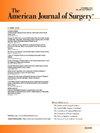Impact of COVID-19 pandemic on surgical training in the United States
IF 2.7
3区 医学
Q1 SURGERY
引用次数: 0
Abstract
The impact of the coronavirus disease COVID-19 pandemic on surgical training in the United States remains a controversial topic. In this study, we examined resident and fellow operative volumes in the pre-COVID-19 and COVID-19 periods across ten different surgical specialties. Accreditation Council for Graduate Medical Education (ACGME) national data reports were collected for ten surgical specialties, including general surgery, neurological surgery, ophthalmology, orthopedic surgery, pediatric surgery, plastic surgery (independent), thoracic surgery, urology, vascular surgery (integrated), and vascular surgery (traditional). Operative volumes were compared between graduates from the pre-COVID-19 (2013–2019) and COVID-19 (2020–2022) periods. Linear regression analysis was used to calculate trends in operative volume. Surgical residents and fellows graduating during the COVID-19 pandemic have greater or similar case volumes, when compared with graduates from the pre-pandemic period. These data suggest that surgical training in the United States has not been compromised by COVID-19 with regard to operative experience.
COVID-19大流行对美国外科培训的影响
冠状病毒COVID-19大流行对美国外科培训的影响仍然是一个有争议的话题。在这项研究中,我们检查了10个不同外科专业在COVID-19前和COVID-19期间的住院医师和同行手术人数。研究生医学教育认证委员会(ACGME)收集了10个外科专业的国家数据报告,包括普通外科、神经外科、眼科、骨科、儿科外科、整形外科(独立)、胸外科、泌尿外科、血管外科(综合)和血管外科(传统)。比较新冠肺炎前期(2013-2019年)和新冠肺炎期间(2020-2022年)毕业生的手术量。采用线性回归分析计算手术量变化趋势。与大流行前的毕业生相比,在COVID-19大流行期间毕业的外科住院医生和研究员的病例量更大或相似。这些数据表明,在手术经验方面,美国的外科培训并未受到COVID-19的影响。
本文章由计算机程序翻译,如有差异,请以英文原文为准。
求助全文
约1分钟内获得全文
求助全文
来源期刊
CiteScore
5.00
自引率
6.70%
发文量
570
审稿时长
56 days
期刊介绍:
The American Journal of Surgery® is a peer-reviewed journal designed for the general surgeon who performs abdominal, cancer, vascular, head and neck, breast, colorectal, and other forms of surgery. AJS is the official journal of 7 major surgical societies* and publishes their official papers as well as independently submitted clinical studies, editorials, reviews, brief reports, correspondence and book reviews.

 求助内容:
求助内容: 应助结果提醒方式:
应助结果提醒方式:


